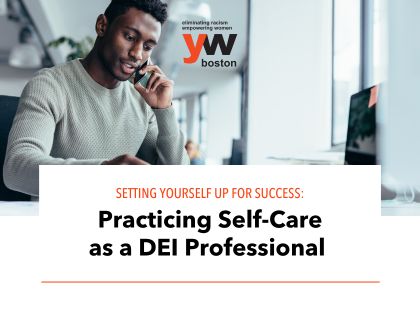
August 3, 2023
By: Aaron Halls
Setting Yourself Up for Success: Practicing Self-Care as a DEI Professional
Self-care is essential for those working in diversity, equity, and inclusion (DEI) workspaces. In this setting, professionals are routinely in contact with challenging subject matters that can negatively impact their mental health, including racism and sexism. Because of this, YW Boston examined how those working in DEI spaces routinely practice self-care. Recently, two members of our InclusionBoston team shared their experiences navigating important DEI work that can be distressing or triggering while making time to practice self-care. In addition, they also provided advice for DEI practitioners looking for ways to practice self-care.
On Practicing Self-Care
Emily Younger, InclusionBoston Senior Coordinator (she/they)
When thinking about practicing self-care, Emily thought back to 2020, around the election. Knowing this period was going to be a stressful time, they took steps to proactively plan for how they wanted to go about self-care by crafting a form tool. Here, they broke down self-care into three categories.
“There are self-soothing activities, which are things like meditation, face masks, and baths — that kind of thing. Then there are self-activating [activities], which are things that you do when you need an energy or mood boost — going for a walk, exercising, reading, escapist fiction, whatever it might be for you. And gift for future self [activities], which is, making a big pot of soup so that you have food for the rest of the week and don’t need to think about it or cleaning the house to distract yourself from the stuff that’s going on, but you get the gift of a clean house.”
With the created form tool, Emily could then brainstorm different activities (self-soothing, self-activating, or gift for future self). Because the tool was made specifically around the election, could then rate how they were feeling about current events and how much capacity they had to engage with the news.
“It’s setting an intention that when there are really intense things going on and you still need to get other things done. [Setting] an intention is a gift to your future self. ‘How much do I want to engage with this? And how can I set myself up for success?’”
Bridget Mutebi, InclusionBoston Manager (she/her)
Because Bridget sees her work in terms of ancestral healing, self-care sometimes for her is attending embodied somatic spaces to help figure out what’s going on in her body.
“Sometimes, on Mondays and late evenings, I’ll go to yoga spaces that are deeply embodied. We’re talking, we’re not just doing yoga, but we’re connecting to talk about what happened in our day, and how we dealt with it. I [also] go to parties, and we’re just showing up to balance as a community.”
Bridget’s spiritual practices also play an important role in her self-care routine including receiving wisdom from her ancestors and guidance from her astrologist. “I rely a lot on the wisdom of the universe and other people. I have a lot of mentors. Also [I also have] self-care spaces that I talk to at the end of the day.”
Advice for Fellow DEI Professionals
Emily Younger, InclusionBoston Senior Coordinator (she/they)
When thinking of self-care advice, Emily thought of a line from the book “Burnout: The Secret to Unlocking the Stress Cycle” by Emily Nagoski. “I don’t know the exact line, but it was something like, according to research, how much rest is adequate? And according to research, the answer is about 42%. And so, then there was a back and forth of like, ‘What if I can’t do 42%?’ And it’s like, ‘Well, if you can’t do 42%, then that 42% is going to take you.’ Eventually, that will all come down on you as burnout all at once.”
They said that’s where proactive planning becomes so necessary, and sometimes it’s even helpful to frame it as system maintenance. “If you don’t maintain yourself. If you’re not putting that work in consistently, and at regular intervals, you’re only going to know that there’s a problem when something fully breaks down – then you need to do some critical care. Making [self-care] a practice that you build into your life, even on the weeks when it’s not stressful so that you have those habits built for when you do have one of those harder weeks, that will be a lot more sustainable in the long run.”
Bridget Mutebi, InclusionBoston Manager (she/her)
One piece of advice from Bridget for DEI professionals is to get to know the work benefits of your workplace. She recommends having those brief conversations with your supervisor or HR to figure out what is accessible.
Our team can help your organization create the necessary cultural shift that will support inclusive policies and practices. Click here to learn more about our DEI Consulting and Training Services.

